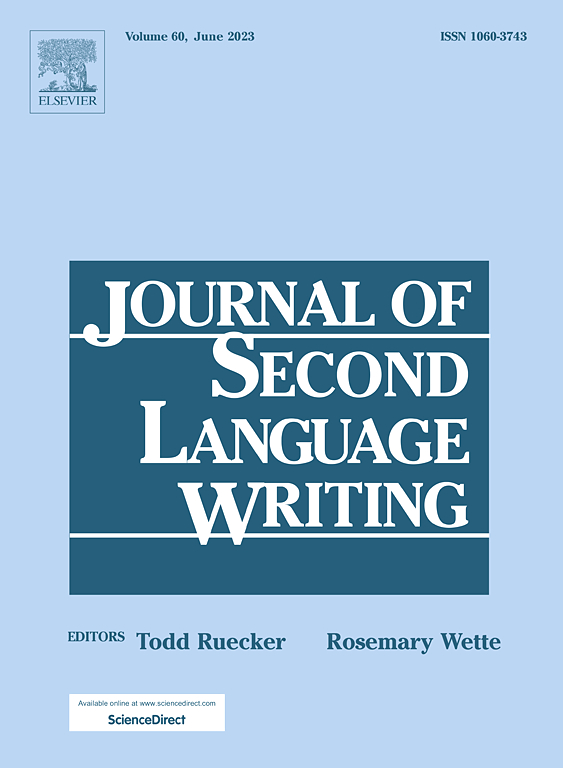Developing students’ reflexive knowledge through EAP instruction
IF 4.5
1区 文学
Q1 LINGUISTICS
引用次数: 0
Abstract
Being reflective means thinking deeply and thoughtfully about one's experiences, thoughts, and emotions, fostering greater self-awareness and understanding. It is a process of self-examination and a skill learners need to develop to fully articulate their ideas and interpretations in writing. While increasing attention is now devoted to promoting students’ reflective practice, instruction that develops their reflexive knowledge remains underexplored. Based on analyses of an EAP teaching context in China, we show how sequenced tasks (guided textual analysis, multi-source feedback, collaborative text reworking and self-assessment) can enhance students’ reflection-on-practice and their use of various kinds of knowledge (cognitive, linguistic, cultural, assessment) in situated contexts. Through analyses of students’ group exemplar and self-feedback, we discuss students’ engagement and reflective judgement in writing through resources of teacher instruction, peer-assisted learning and self-assessment.
通过EAP教学培养学生的反身性知识
反思意味着对一个人的经历、想法和情感进行深入而深思的思考,培养更强的自我意识和理解。这是一个自我检查的过程,也是学习者需要发展的技能,以充分表达他们的想法和书面解释。虽然现在越来越多的关注致力于促进学生的反思性实践,但开发他们的反思性知识的教学仍未得到充分的探索。基于对中国EAP教学情境的分析,我们展示了顺序任务(引导文本分析、多源反馈、协作文本重写和自我评估)如何提高学生的实践反思能力以及他们在情境中对各种知识(认知、语言、文化、评估)的使用。通过对学生群体范例和自我反馈的分析,我们通过教师指导、同伴辅助学习和自我评价等资源来讨论学生在写作中的参与度和反思性判断。
本文章由计算机程序翻译,如有差异,请以英文原文为准。
求助全文
约1分钟内获得全文
求助全文
来源期刊

Journal of Second Language Writing
LINGUISTICS-
CiteScore
8.80
自引率
13.10%
发文量
50
审稿时长
59 days
期刊介绍:
The Journal of Second Language Writing is devoted to publishing theoretically grounded reports of research and discussions that represent a significant contribution to current understandings of central issues in second and foreign language writing and writing instruction. Some areas of interest are personal characteristics and attitudes of L2 writers, L2 writers'' composing processes, features of L2 writers'' texts, readers'' responses to L2 writing, assessment/evaluation of L2 writing, contexts (cultural, social, political, institutional) for L2 writing, and any other topic clearly relevant to L2 writing theory, research, or instruction.
 求助内容:
求助内容: 应助结果提醒方式:
应助结果提醒方式:


